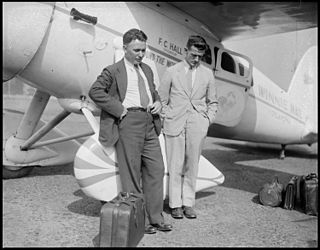A Quote by Jeff Vandermeer
It is the nature of the writer to question the validity of his world and yet rely on his senses to describe it. From what other tension can great literature be born?
Related Quotes
I do not believe there is any such sixth sense. A man with a good sense of direction is, to me, quite simply an able pathfinder - a natural navigator - somebody who can find his way by the use of the five senses (sight, hearing, taste, smell and touch - the senses he was born with) developed by the blessing of experience and the use of intelligence. All that pathfinder needs is his senses and knowledge of how to interpret nature's signs.
It's an experience like no other experience I can describe, the best thing that can happen to a scientist, realizing that something that has happened in his or her mind exactly corresponds to something that happens in nature. One is surprised that a construct of one's own mind can actually be realised in the honest-to-goodness world out there. A great shock, and a great, great joy.
I can't get used to the ease with which one covers the world today. It's no longer an effort--Pole--equator--oceans--continents--it's just a question of which way you point the nose of your plane. The pure joy of flight as an art has given way to the pure efficiency of flight as a science.... Science is insulating man from life -- separating his mind from his senses. The worst of it is that it soon anaesthetizes his senses so that he doesn't know what he's missing.
The lover of nature is he whose inward and outward senses are still truly adjusted to each other; who has retained the spirit of infancy even into the era of manhood. His intercourse with heaven and earth, becomes part of his daily food. In the presence of nature, a wild delight runs through the man, in spite of real sorrows.
Man is born an asocial and antisocial being. The newborn child is a savage. Egoism is his nature. Only the experience of life and the teachings of his parents, his brothers, sisters, playmates, and later of other people FORCE HIM to acknowledge the advantages of social cooperation and accordingly to change his behavior.
The question that faces every man born into this world is not what should be his purpose, which he should set about to achieve, but just what to do with life? The answer, that he should order his life so that he can find the greatest happiness in it, is more a practical question, similar to that of how a man should spend his weekend, then a metaphysical proposition as to what is the mystic purpose of his life in the scheme of the universe.
As the years go by, he returns to this invisible world rather than to earth for peace and solace. There also he finds a profound enchantment, although he can seldom describe it. He can discuss it with others of his kind, and because they too know and feel its power they understand. But his attempts to communicate his feelings to his wife or other earthly confidants invariable end in failure.





































